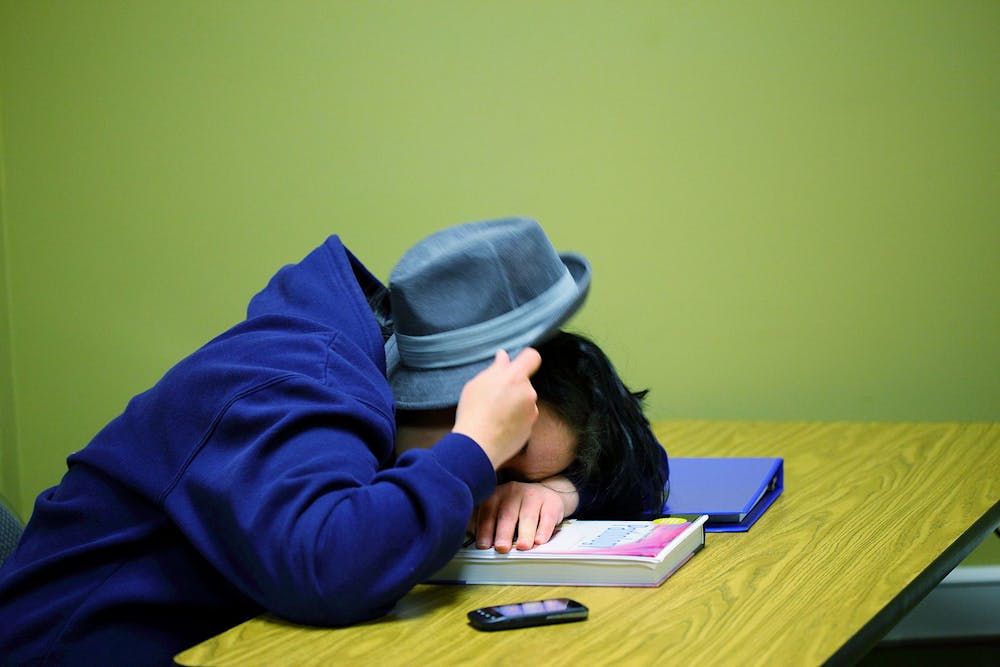Books, wrappers, energy drink cans and empty Starbucks cups cover the floor. Students’ heads are noisy with Fibonacci numbers, Hume, Laffer curves or whatever happens to be pouring into it while the rest of the world seems at its most serene in the quiet of the night. This scene is a familiar one in the frantic four years of college, says Elaine Bailey, psychologist and sleep expert at University Student Health.
“College is a very stressful time, and we see a number of people whose sleep problems kick off when they come to college,” Bailey said.
Bailey’s explanation for why we see college students having problems with sleep is simple — time is limited.
“There’s a triangle in college where you have sleep, studying and a social life, and there’s a saying that says you can only pick two,” Bailey said. “You need all three, but there is only so much time in the day. That’s a struggle we often see is trying to balance all those demands.”
Second-year College student Ronak Rijhwani also blames the problem with sleep on time restraints. He explains that he tends to take all-nighters when working on deadlines he has put off, but tries not to pull them too frequently.
“If you can be productive enough with your time and wake up early and get work done, there should never be a need to pull an all-nighter,” Rijhwani said.
But before students surrender fearing they will lose the battle for sleep, they must realize what is at stake, according to Stephanie Hartman, a staff physician at University Student Health.
Hartman says the hormones our bodies need to function are altered under sleep deprivation.
“One example is an increase in cortisol level after a night of poor sleep, which is the body’s stress hormone,” Hartman said in an email. “This is one of the reasons why lack of sleep affects our memory and attention, our judgment and ability to make decisions and our coordination. It also causes negative changes in our mood and emotional lability.”
As a result of several studies, the medical community now knows that these physiological reactions can make meaningful differences in students’ lives.
“Some studies have shown that sleep deprivation causes impairments in cognitive and motor function similar to as if someone was legally intoxicated,” said Hartman.
Hartman has even found studies showing that the impairments are so significant they can directly affect students’ grade point averages. This body of research from the University of Michigan suggests that students with good sleep hygiene have higher grades than those who do not.
Sleep does not relax its grip on our lives as we age past student-hood, either. According to Hartman, patterns of getting too little sleep in one’s youth can increase their risk of heart disease, mental health disorders, diabetes, high blood pressure, obesity and stroke when they are older.
However, Bailey says that finding the time to sleep in college is as difficult as a juggling act with three balls – sleep, studying and your social life. Even still, Bailey emphasizes a stress-free attitude towards one’s nightly slumber.
“A lot of people want sleep to be an on-demand kind of thing,” Bailey said. “It would be great if sleep works that way, but it doesn’t. A lot of students are very results oriented, but sleep is not something that you can make yourself do. You can’t work until midnight and expect to be asleep by 12:01. Create a time to transition to sleep. Most of the time, that’s 30 to 60 minutes at night before bed to wind down.”
How exactly can you wind down at night? By unplugging, avoiding using technology in bed and turning devices on silent according to Hartman. Bailey even revealed that the blue light of cell phone screens is damaging to sleep — as it suppresses melatonin, the “sleep” hormone — and that there exist specific glasses to block blue light for those who have no choice but to use technology in bed.
Despite their warnings about sleep deprivation, both Bailey and Hartman recognize that even the best sleepers’ plans can go astray. Sleep deprivation happens, and Bailey recommends staying calm and taking the proper steps to get rested again.
“We can accommodate for getting too little sleep on occasion, Bailey said. “Avoid energy drinks and coffee in the afternoon the day after the all-nighter. Be very careful about napping — you don’t want to bail and go napping for 5 hours in the middle of the day.”
Bailey believes the key to sleeping well is actually waking up at a consistent time each day. Even after staying up all night, waking up around the same time as you normally would — with only a one or two-hour variance — helps to even out your sleep schedule, she explains.
Rijhwani agrees, and for him, sleep hygiene is more than just doctor’s orders. He believes sleep and achievement are lifestyles intertwined.
“The most high achieving people are those who can stay healthy and have a routine without having to pull consistent all-nighters,” Rijhwani said.







